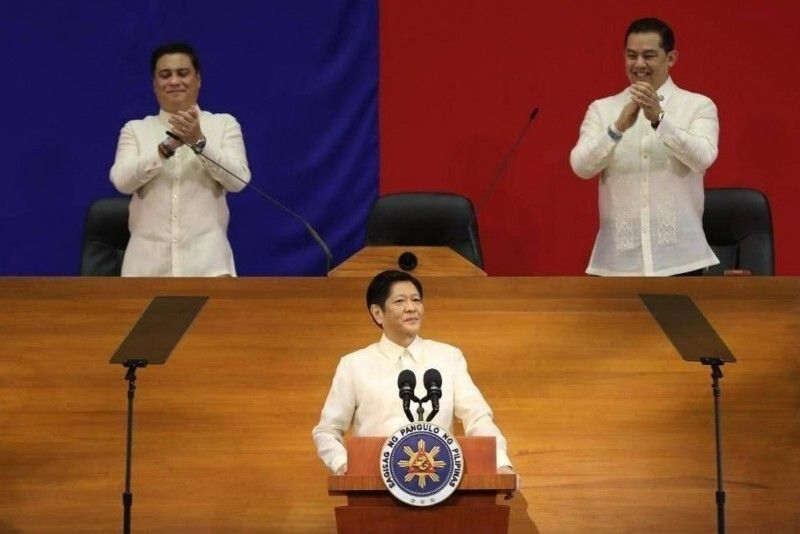Biz groups oppose creation of Maharlika Wealth Fund

MANILA, Philippines — Business groups joined a clarion call to oppose the Marcos Jr. administration’s plan to create a sovereign wealth fund, owing to concerns of fiscal prudence, transparency and economic interventionism.
Business groups composed of the Foundation for Economic Freedom, Competitive Currency Forum, Filipina CEO Circle, Financial Executives Institute of The Philippines, Institute of Corporate Directors, Integrity Initiative, Inc, Makati Business Club, Management Association of The Philippines, Movement for Good Governance, Philippine Women's Economic Network, UP School of Economics Alumni Association, and the Women’s Business Council Philippines, Inc, released the statement on Monday.
If enacted, the bill would order state pension funds Government Service Insurance System and the Social Security System, as well as state-owned lenders Land Bank of the Philippines and the Development Bank of the Philippines to provide an initial investment of P200 billion to Maharlika.
Maharlika — a word originally meaning warrior class — is a likely reference to one of the myths created by the late dictator Marcos Sr., who claimed he led a guerilla unit called "Maharlika" during the Japanese Occupation.
Separately, the government will inject P25 billion into Maharlika, while the Bangko Sentral ng Pilipinas and the Philippine Amusement and Gaming Corp. — the gambling and casino regulator — will also contribute to the fund.
“The principles of fiscal prudence, additionality, solvency of social pension funds, contingent liabilities, monetary independence of the Bangko Sentral ng Pilipinas (BSP), government in the economy, and transparency,” the statement read.
For these business groups, fiscal prudence was top of mind. They noted that the Philippines does not have commodity-based surpluses, not even from its foreign trade activities and state-owned enterprises (SOE).
They explained that commodity-based SWFs are built to “optimally” manage wealth generated from the cultivation of natural resources. Countries that decide to set this up are aware that these resources, such as those extracted from mining activities for example, will eventually dry up. Likewise, predicting the prices of these commodities is uncertain owing to the volatility of markets.
Non-commodity-based SWFs are centered on the accumulation of foreign assets from surpluses from external trade and SOEs. The goal of this SWF is preserving the value of the capital to keep investments running in the long-term.
These business groups likewise pointed out that the creation of the Maharlika will not be filling in any gaps, or “missing institutions” within the domestic economy.
“The country does not have a bonanza of commodity surpluses that need to be deployed.Instead of leaving a legacy of surplus funds to be managed for future generations, the current generation is leaving a legacy of heavy indebtedness which future generations need to pay or refinance,” they added.
Pension funds at risk?
The joint statement also pointed out the solvency of the country’s retirement funds, held under the Government Service Insurance System (GSIS) and Social Security System (SSS). These funds are owned by Filipinos, which the business groups pointed out would expose these funds to unnecessary risks by using it as seed capital for the Maharlika.
Finance Secretary Benjamin Diokno told journalists on Monday that he was opposed to the idea of guarantees baked into Maharlika since these are investments.
Likewise, the statement pointed out that if the investments of these pension funds do fall prey to poor investment decisions, the government is guaranteeing these funds. This meant it could become actual liabilities for the government, further limiting the government’s spending decisions.
In a probe on Monday, Sen. JV Ejercito noted that he agrees with the principles of Maharlika, but took exception with this idea.
“The similar bill I filed before did not identify GSIS & SSS Funds. I am apprehensive to touch pension funds because of past experience with AFPSLAI, AMSLAI and RSBS which ventured into bad investments,” he said.
Likewise, the senator noted that while the Maharlika holds benefits, the Marcos Jr. administration should think twice before it uses retirement funds for this purpose.
“The intent of Maharlika Bill seems good, except that I am wary to use GSIS & SSS Funds for this purpose,” Ejercito added.
The business groups' statement also noted that the Maharlika’s creation could impede on the independence of the BSP, since the SWF has a provision requiring 50% of the central bank's cash dividends.
“The House Bill fails to realize that sequestering the dividends of government-owned-and-controlled corporations to the SWF will also impair the National Government’s own ability to fund the fiscal deficit and increase the pressure to borrow more from both domestic and foreign sources,” the statement read.
These business groups also noted that the Maharlika’s existence would usher in a period of economic intervention from the government. Administrations in the post-Martial Law Philippines has long tried to shed this image, since state-led decisions left economic problems that the country is still unraveling.
Diokno expects that the bill creating the country’s sovereign wealth fund would be passed by middle of next year. But the fund’s deployment as an investment vehicle would still take “a longer time.”
- Latest
- Trending




























